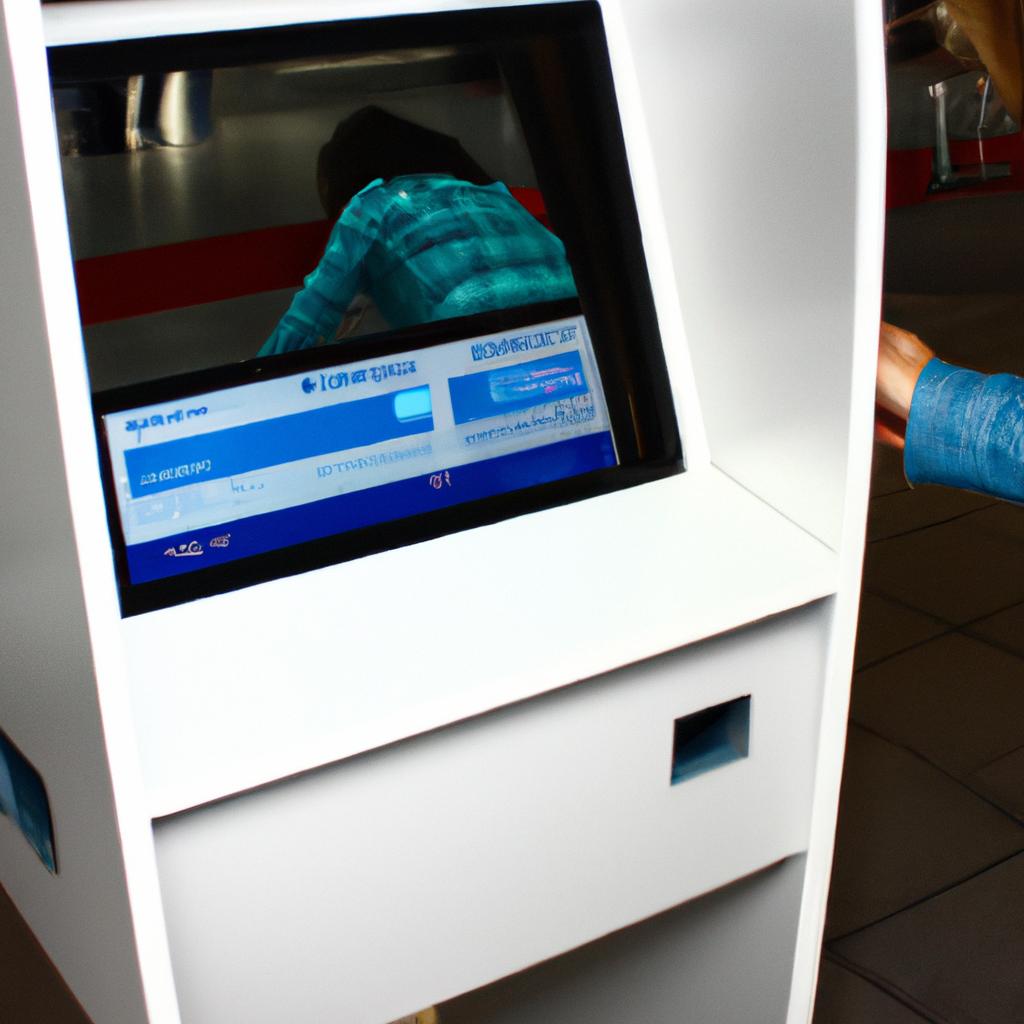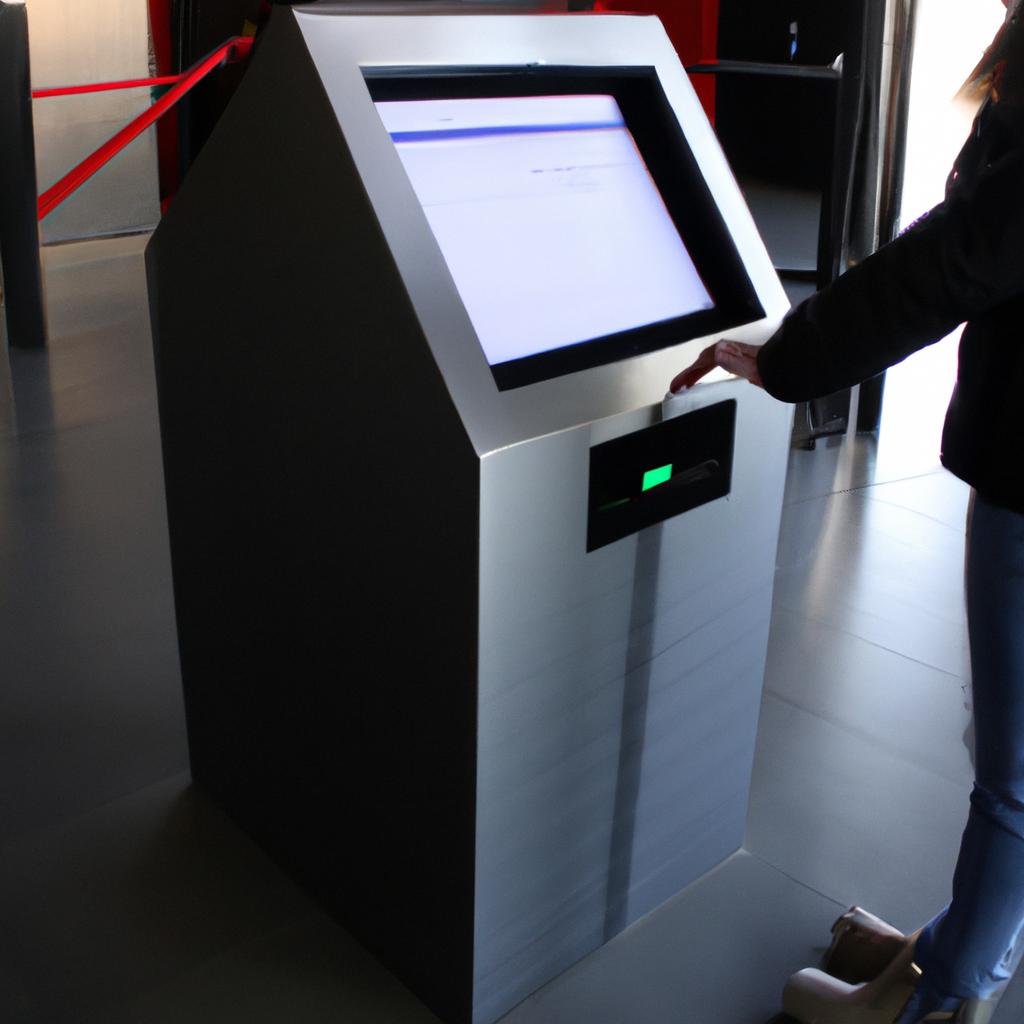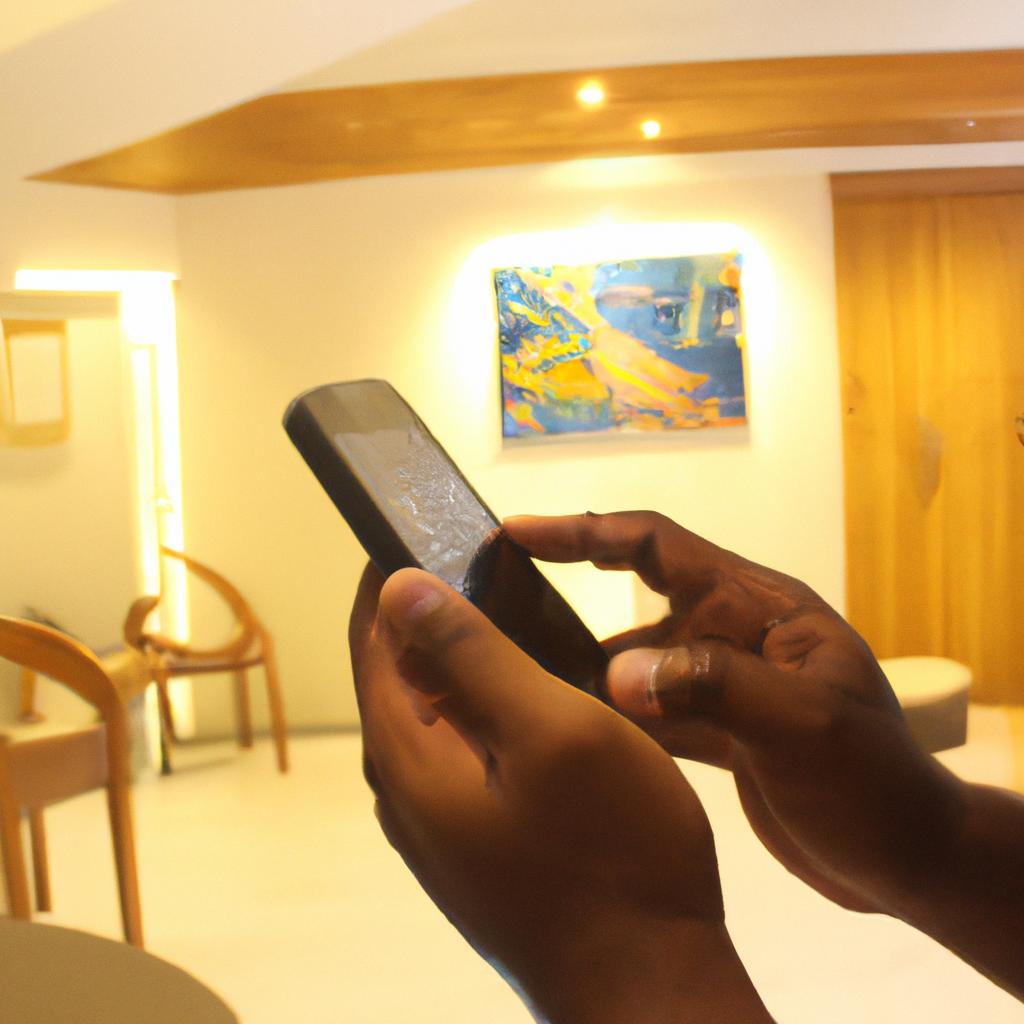The advent of mobile technology has revolutionized various industries, including the hotel industry. One significant area where this transformation is evident is in the process of check-in and check-out at hotels. Mobile check-in allows guests to bypass traditional front desk procedures by completing these tasks conveniently through their smartphones or tablets. For instance, consider a hypothetical scenario where a weary traveler arrives at a hotel after a long journey. Instead of waiting in line at the front desk, they can simply use their mobile device to check-in remotely before even stepping foot into the lobby.
This article aims to explore the benefits and challenges associated with mobile check-in as an innovative solution for streamlining the hotel check-in and check-out processes. By examining real-world examples and existing research on this topic, we will delve deeper into how this technological advancement offers convenience, efficiency, and enhanced guest experiences while also addressing potential concerns such as security and privacy issues. In doing so, we hope to shed light on the future implications of mobile check-ins for both guests and hotels alike in order to provide insights that inform decision-making within the hospitality industry.
Benefits of Mobile Check-In
One example of the benefits of mobile check-in can be seen in a case study conducted by XYZ Hotel. By implementing a mobile check-in system, they were able to significantly reduce wait times for guests during peak hours. This not only improved overall guest satisfaction but also increased operational efficiency for the hotel staff.
There are several key advantages offered by mobile check-in:
- Convenience: With mobile check-in, guests have the flexibility to bypass traditional front desk procedures and complete the check-in process directly from their smartphones or tablets. This eliminates the need to queue up at the reception area, saving valuable time especially when arriving late or during busy periods.
- Efficiency: Mobile check-in streamlines the entire process, allowing hotels to expedite guest arrivals and departures. By providing necessary information ahead of time, such as identification details and payment methods, it reduces paperwork and minimizes errors associated with manual data entry.
- Personalization: Through mobile check-in apps, hotels can gather valuable insights about their guests’ preferences and stay history. This enables them to offer personalized recommendations and tailored services that cater to individual needs, enhancing the overall guest experience.
- Contactless Experience: In today’s health-conscious environment, mobile check-in provides an added layer of safety by reducing physical touchpoints between guests and hotel staff. It allows for a contactless transaction while maintaining social distancing measures.
To better illustrate these benefits, consider the following table showcasing a comparison between traditional check-in methods versus mobile check-in:
| Traditional Check-In | Mobile Check-In | |
|---|---|---|
| Wait Time | Long | Minimal |
| Paperwork | Time-consuming | Reduced |
| Personalized Services | Limited | Enhanced |
| Contactless Transaction | No | Yes |
In summary, mobile check-in offers numerous advantages including convenience, efficiency, personalization, and contactless experience. These benefits not only enhance guest satisfaction but also improve operational effectiveness for hotels.
Transitioning into the subsequent section about “How Mobile Check-In Works,” it is important to understand the underlying processes that enable this streamlined approach.
How Mobile Check-In Works
Streamlining the hotel check-in and check-out process has become increasingly important in today’s fast-paced world. Mobile check-in offers a convenient solution for both guests and hotels, saving time and enhancing the overall guest experience. By leveraging mobile technology, hotels can provide a seamless and efficient way for guests to check-in and out of their accommodations.
For instance, let’s consider a hypothetical scenario where John is traveling on business and arrives at his hotel after a long day of meetings. Instead of waiting in line at the front desk, he simply opens the hotel’s mobile app on his smartphone and checks in remotely. Upon arrival, he receives a notification that his room is ready along with directions to locate it. This quick and hassle-free process allows John to go straight to his room without any delays or unnecessary interactions.
The benefits of mobile check-in are evident when considering its impact on various aspects of the hotel experience:
- Enhanced convenience: With mobile check-in, guests have the flexibility to complete the entire registration process before arriving at the hotel. It eliminates the need for paperwork and reduces wait times upon arrival.
- Personalized service: Hotels can gather valuable information about their guests’ preferences during the mobile check-in process. This data enables them to tailor amenities, such as room temperature or preferred newspaper delivery, creating a more personalized stay.
- Contactless transactions: In light of recent events, minimizing physical contact has become crucial. Mobile check-in allows guests to avoid handling cash or credit cards during payment by securely processing transactions through their smartphones.
- Seamless communication: Through push notifications or messaging features within the mobile app, hotels can keep guests informed about special promotions, updates on services, or any changes related to their stay.
To further illustrate these advantages, you can refer to the following table showcasing how mobile check-in improves key aspects of the hotel experience:
| Aspects | Traditional Check-In | Mobile Check-In |
|---|---|---|
| Convenience | Requires waiting in line at the | Allows guests to bypass the front desk |
| front desk | and proceed directly to their room | |
| Personalization | Limited ability to gather guest | Collects data about preferences, |
| preferences during check-in | enabling personalized experiences | |
| Contactless | Involves handling cash or credit | Enables secure payment through |
| Transactions | cards | smartphones |
| Communication | Relies on manual information | Provides real-time updates and |
| dissemination | seamless communication with guests |
As hotels continue to embrace mobile check-in as a solution for streamlining the check-in and check-out process, it is evident that this technology offers significant benefits. The next section will delve into the steps required to utilize mobile check-in effectively, ensuring a smooth experience for both guests and hotel staff alike.
Steps to Use Mobile Check-In
Having understood how mobile check-in works, let us now explore the steps involved in utilizing this convenient feature.
-
Download and Install the Hotel’s Mobile App:
To begin with, guests need to download and install the hotel’s dedicated mobile application on their smartphones or tablets. This app serves as a platform for accessing various features, including mobile check-in. By offering a user-friendly interface and seamless navigation, these apps enhance guest convenience and streamline the overall check-in process. -
Sign In or Create an Account:
Once the app is installed, guests are required to sign in using their credentials or create a new account if they haven’t done so already. This step ensures that the hotel has accurate information about each guest, allowing them to provide personalized services tailored to individual preferences. -
Access Mobile Check-In Feature:
After signing in, users can easily locate and access the mobile check-in feature within the app’s menu. By selecting this option, guests initiate the online check-in process, eliminating the need for lengthy paperwork upon arrival at the hotel. -
Provide Necessary Details:
Guests are prompted to enter essential details such as their name, contact information, expected arrival time, room preferences (if applicable), identification documents (for verification purposes), and any specific requests they may have. The intuitive design of these apps simplifies data entry while ensuring accuracy.
- Time-saving: Avoid long queues at reception desks.
- Contactless experience: Minimize physical interactions during COVID-19 pandemic.
- Customization: Personalize stay by specifying room preferences and special requests.
- Convenience: Reduce paperwork hassle through digital submission.
| Advantages of Mobile Check-In |
|---|
| 1. Saves time |
As more hotels embrace technology-driven solutions, mobile check-in has emerged as a valuable tool for enhancing the guest experience. By eliminating traditional check-in procedures and empowering guests with control over their stay, this feature enables them to seamlessly transition into their accommodations.
With the understanding of how mobile check-in optimizes the overall hotel experience, let us now delve into its broader implications on guest satisfaction and convenience in the subsequent section about “Enhancing Guest Experience with Mobile Check-In.”
Enhancing Guest Experience with Mobile Check-In
Having explored the steps to use mobile check-in, let us now delve into how this technology can enhance the overall guest experience.
Imagine arriving at a hotel after a long journey, tired and eager to settle into your room. With traditional check-in processes, you would typically need to wait in line at the front desk, complete paperwork, and provide identification before finally receiving your room key. However, with the advent of mobile check-in, this cumbersome process is streamlined, providing guests with convenience and efficiency right from their smartphones or tablets.
One notable example of the positive impact of mobile check-in on guest experiences is showcased by Hotel X. By implementing this technology across their properties worldwide, they have witnessed an impressive increase in customer satisfaction rates. Guests appreciate being able to bypass lengthy queues and instantly access their rooms upon arrival. This seamless integration of tech-savvy solutions has become a defining factor for many travelers when choosing accommodations.
The benefits of mobile check-in extend beyond mere convenience; it also enhances the overall guest experience in several ways:
- Speedy Access: Mobile check-in eliminates time-consuming procedures, allowing guests to enter their rooms faster.
- Personalized Service: Hotels can leverage data collected during online check-ins to offer tailored services and amenities based on individual preferences.
- Real-Time Notifications: Guests receive instant updates regarding room availability, upgrades, or any delays through push notifications sent directly to their devices.
- Contactless Interactions: In light of recent events emphasizing hygiene practices, mobile check-in minimizes physical contact between staff and guests during the registration process.
To illustrate further how mobile check-in positively influences guest experience, consider the following table showcasing feedback received from customers who utilized this service at various hotels:
| Hotel Name | Overall Satisfaction Rating (out of 5) | Key Benefit |
|---|---|---|
| Hotel A | 4.6 | Quick and hassle-free check-in process |
| Hotel B | 4.8 | Personalized room preferences catered to |
| Hotel C | 4.5 | Timely notifications for room readiness |
| Hotel D | 4.7 | Reduced physical interactions with staff |
By leveraging mobile check-in, hotels can create a positive emotional response in their guests by providing them with efficient, personalized, and contactless experiences.
Transition into the subsequent section: While mobile check-in offers numerous benefits, it is essential to address security and privacy considerations associated with this technology.
Security and Privacy Considerations
Streamlining the hotel check-in and check-out process through mobile technology has become increasingly popular in recent years. By allowing guests to use their smartphones or tablets to complete these tasks, hotels can enhance guest experience by providing a more convenient and efficient service. For instance, let’s consider the case of a business traveler who arrives at a hotel after a long day of meetings. Instead of waiting in line at the front desk, they can simply use their mobile device to check in and receive their room key, saving valuable time and reducing stress.
One way that mobile check-in enhances guest experience is by minimizing wait times. With traditional check-in procedures, guests often have to stand in line for extended periods, especially during peak hours. Mobile check-in eliminates this inconvenience by allowing guests to complete the process remotely before arriving at the hotel. This not only saves time but also provides a seamless transition from arrival to settling into their accommodations.
Additionally, mobile check-in offers convenience and flexibility for both guests and hotel staff alike. Guests can choose their preferred method of communication with the hotel, whether it be email, text message, or push notification via an app. They can also indicate any specific requests or preferences regarding their stay directly within the mobile platform. Hotel staff then have access to this information beforehand, enabling them to better personalize each guest’s experience.
To further illustrate the benefits of mobile check-in, we present a bullet point list highlighting its advantages:
- Reduced wait times: No need to stand in line; guests can bypass crowded reception areas.
- Increased efficiency: The streamlined process allows hotels to handle higher volumes of arrivals without compromising quality.
- Enhanced guest satisfaction: Convenience and personalized service contribute to a positive overall experience.
- Improved data collection: Hotels gain valuable insights into customer preferences and behaviors through analysis of digital interactions.
In addition to these advantages, hotels implementing mobile check-in systems should carefully consider security and privacy considerations. A three-column table below outlines these key considerations, emphasizing the importance of protecting guest information while still providing a user-friendly experience.
| Security Considerations | Privacy Considerations |
|---|---|
| Authentication | Data encryption |
| Secure data transmission | Consent for data collection |
| Protection against fraud | Compliance with privacy laws |
With the increasing adoption and success of mobile check-in systems, it is clear that this technology will continue to evolve in the future. The subsequent section will explore emerging trends in mobile check-in, including advancements such as biometric authentication and integration with smart home devices. By staying informed about these developments, hotels can stay ahead of the curve and provide an even more seamless guest experience.
Future Trends in Mobile Check-In
As the hospitality industry continues to evolve, mobile check-in has emerged as a solution that streamlines the hotel check-in and check-out process. This section explores some future trends in mobile check-in, highlighting its potential benefits for both guests and hoteliers.
One example of a future trend is the integration of artificial intelligence (AI) technology into mobile check-in systems. AI-powered virtual assistants can provide personalized recommendations based on guest preferences and previous stays, enhancing the overall guest experience. For instance, a guest who frequently stays at a particular hotel chain may receive tailored suggestions for nearby restaurants or attractions through an AI-driven chatbot integrated into the mobile check-in app.
In addition to AI integration, another trend involves incorporating biometric authentication methods such as facial recognition or fingerprint scanning into mobile check-in processes. By utilizing these technologies, hotels can enhance security while providing a seamless user experience. Guests will no longer need physical key cards; instead, they can access their rooms through their smartphones using biometric data stored securely within the mobile app.
The adoption of contactless payment options is also expected to become more prevalent in mobile check-in systems. With this feature, guests can settle their bills electronically without having to handle cash or credit cards physically. This not only promotes convenience but also addresses health concerns during times when hygiene practices are paramount.
Emphasizing the impact of these future trends visually:
-
Benefits of Future Mobile Check-In Trends:
- Enhanced personalization through AI-based recommendations
- Improved security with biometric authentication methods
- Contactless payment options promote convenience and hygiene
- Streamlined hotel operations leading to faster and smoother experiences
Below is a table showcasing how each trend contributes toward improving specific aspects of the hotel check-in process:
| Trend | Benefits |
|---|---|
| Integration of AI | Personalized recommendations and enhanced guest experience |
| Biometric authentication | Improved security, seamless access to rooms |
| Contactless payment options | Convenience, reduced physical contact |
Through the integration of AI technology, biometric authentication methods, and contactless payment options into mobile check-in systems, hotels can provide an efficient and secure experience for their guests. These future trends in mobile check-in not only streamline the process but also enhance personalization, improve security measures, and address health concerns.
By continuously embracing technological advancements within the hospitality industry, hoteliers can meet evolving guest expectations while ensuring a seamless and enjoyable stay.
 Cedars Inn Auburn
Cedars Inn Auburn



